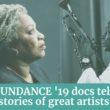The Sundance World Dramatic Competition always features international hidden gems, and the 2019 highlights included Queen of Hearts and The Last Tree.
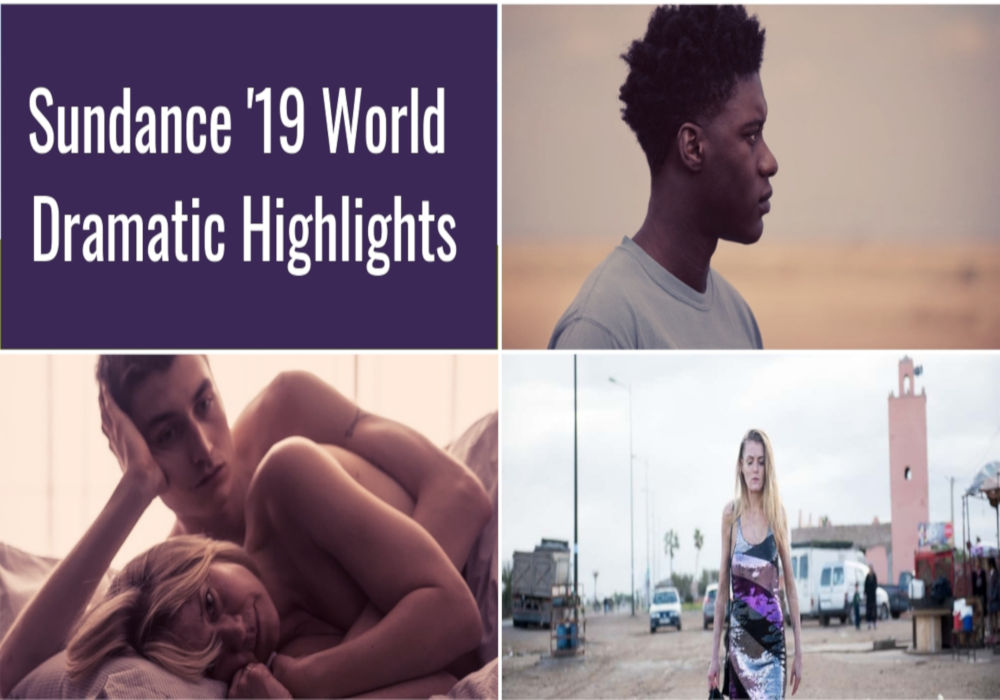
The Sundance Film Festival made its name launching American independent auteurs like Steven Soderbergh, Richard Linklater, and Debra Granik. So it’s easy to forget that Sundance’ s programming is almost equally divided between American films (in the US Dramatic and US Documentary competitions) and international films (in the World Dramatic and World Documentary competitions). To be fair, the buzziest films in the Premieres and Documentary Premieres tend to tip the scales in the direction of the US.
The World Dramatic Competition always features some terrific under-the-radar international films
Yet year after year, Sundance launches terrific international films — films that, depressingly, often get lost in the shuffle. Its showcase program for emerging international auteurs is the World Dramatic Competition.
In 2014, the program launched Blind, the directorial debut of Norwegian writer-director Eskil Vogt (who has also co-written all of Joachim Trier’s films), and one of the most original films of the decade. In 2015, the program played host to Anne Sewitsky’s sophomore film, Homesick, one of the best films of the year, which marked Sewitsky and her leading lady Ine Willman as talents to watch; they returned to Sundance this year with the excellent Sonja: The White Swan.
In 2016, there was Rebecca Daly’s psycho-sexual drama Mammal and Elite Zexer’s heartbreaking mother-daughter story Sand Storm. In 2017, there was the breakout hit God’s Own Country (which we loved so much we wrote a book on it), and last year, there was the Oscar shortlisted The Guilty. All of these films made my best of the year lists in their respective years, but chances are, you haven’t heard of them.
That’s partly because the World Dramatic Competition is the program most skipped by critics, and thus least talked about during the festival. You can find yourself queuing for two hours to get into the press screening of a popular Premiere like Call Me by Your Name or Mistress America (I did), but show up five minutes before any World Dramatic Competition press screening, and there will be about five other critics in the cinema.
The festival doesn’t make it easy to see the program, with just one press screening of each film, all counter-programmed against each other so that even motivated critics have to travel all around town to public screenings to see the whole program. Most people don’t bother; it’s hard enough to tetris your schedule for the films that will actually get clicks, let alone the ones that might not even merit a low-readership piece.
It’s hard to justify going out of your way to take a chance on a film that could be worthwhile because you might miss something else, and the film might also be mediocre. Any competition film at Sundance is a gamble since most are by relatively untested directors, but the films in the World Dramatic Competition rarely even have the benefit of American stars.
It’s hard to justify going out of your way to take a chance on a film that could be worthwhile because you might miss something else, and the film might also be mediocre. Any competition film at Sundance is a gamble since most are by relatively untested directors, but the films in the World Dramatic Competition rarely even have the benefit of American stars.
The World Dramatic Competition struggles to get buzz and press coverage
The World Dramatic Competition regularly finds worthwhile films or exciting emerging auteurs, counting folks like Sophie Hyde (who returned in 2019 with Animals) and Tali Shalom Ezer (Princess) among its alumni. But the films don’t tend to get seen or appreciated.
The lack of critical attention doom the films in this program to perpetual obscurity. Jack Reynor won a jury award for Best Actor in 2015 for his terrific work in the Irish film Glassland, but it got very little festival buzz afterward; when he returned to Sundance a year later with Sing Street, most viewers seemed surprised that he was such a star. Barry Keoghan (Killing of a Sacred Deer, Dunkirk) did some of the best work of his career in Mammal opposite Rachel Griffiths in 2016, but the film virtually disappeared afterward. And the list goes on.
This year may have been the first year that one of the World Dramatic Competition titles actually arrived at the festival with a major distributor already in tow: Joanna Hogg’s The Souvenir was picked up by A24 before it was even programmed at the festival. Having already made three excellent films, though ones that tended to skip the festival circuit, she already seemed like she had too much clout to be in the competition. So it should come as no surprise that the film not only took home the top prize but was practically the only film in this year’s competition to garner critical buzz. But that may have been to the detriment of some of the other worthy titles in the program, with Hogg’s film hogging all the air.
Queen of Hearts (dir. May el-Toukhy)
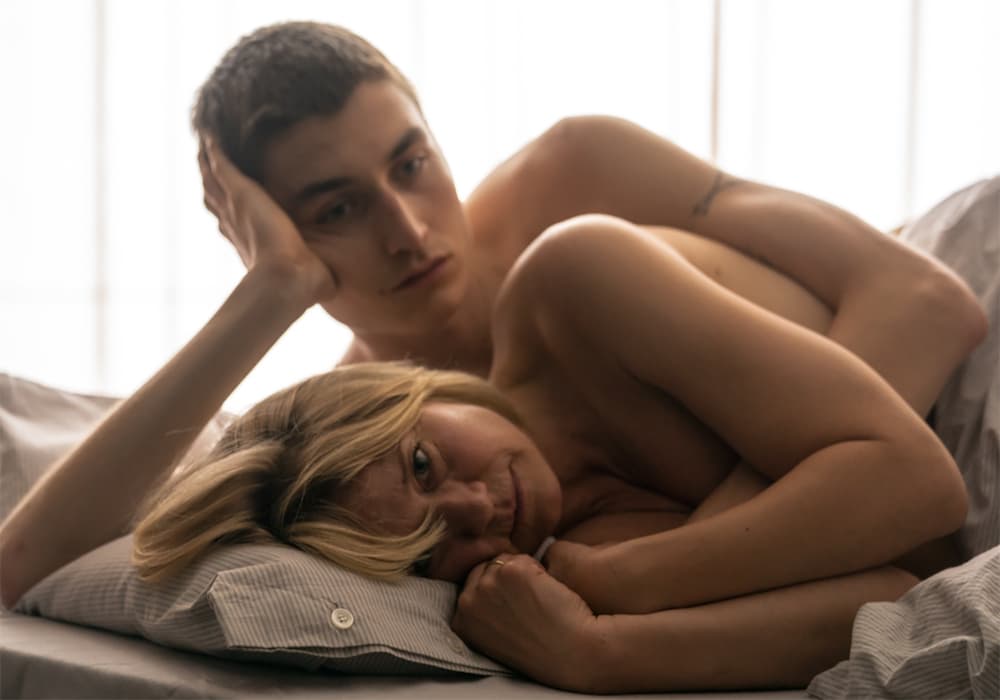
This year’s less talked about standout film for me was May el-Toukhy’s Queen of Hearts, a Danish drama about a high-powered middle-aged lawyer who begins an affair with her 17-year-old step-son. It’s also, oddly, the third excellent incest-adjacent film in four years (alongside Homesick and Mammal) to screen in the World Dramatic competition.
Told entirely from the protagonist’s perspective — there isn’t a scene without her — Queen of Hearts presents us with a flawed and difficult woman, Anne (Trine Dyrholm), whose desires are real, but whose choices prove increasingly morally ambiguous. As a woman who works cases to help abused children and women, she knows what holds up in court and what doesn’t. Her clients are, initially, presented to us as proof of her compassion, but these scenes take on a more sinister tone as the film progresses and you wonder just how calculated her affair was and how carefully she chose her victim.
Shot in icy blues and whites and among the hard edges of a modernist home, there’s nothing very comfortable about this environment; el-Toukhy doesn’t want us to get cosy with our morally slippery leading lady.
Dolce Fine Giornata (dir. Jack Borcuch)
Dolce Fine Giornata, the second film in the competition about a high-powered middle-aged woman. is more didactic and less nuanced than Queen of Hearts. Like Anna, Maria Linde (Krystyna Janda) is also prickly but her morally complicated actions are public rather than secret: she makes a wild political statement in a public speech that goes viral, and in the process, she unintentionally helps to incite racist violence.
The film attempts to dramatize the damage white European privilege can do, and the precarity of the lives of Arab immigrants — even non-Muslim ones — in Europe. But its ideas are a bit inchoate, and the final image of the film is so obvious you leave with the pang of being hit over the head with a blunt object.
[click_to_tweet tweet=”The World Dramatic Competition has always had room for stories of women over thirty, and these are often among its best selections.” quote=”The World Dramatic Competition has always had room for stories of women over thirty, and these are often among its best selections.”]
Eskil Vogt’s Blind (2014) was about the inner life of a middle-aged woman losing her sight. The Second Mother (2016) was the story of a middle-aged Brazilian maid and her relationship with her employer’s son — whom she treated as her own — and her own biological daughter. And in 2017, the Turkish film My Happy Family told the touching and inspiring story of a middle-aged house wife who decided to move out and find her independence. The latter two were both directed by women.
The Last Tree (dir. Shola Amoo)
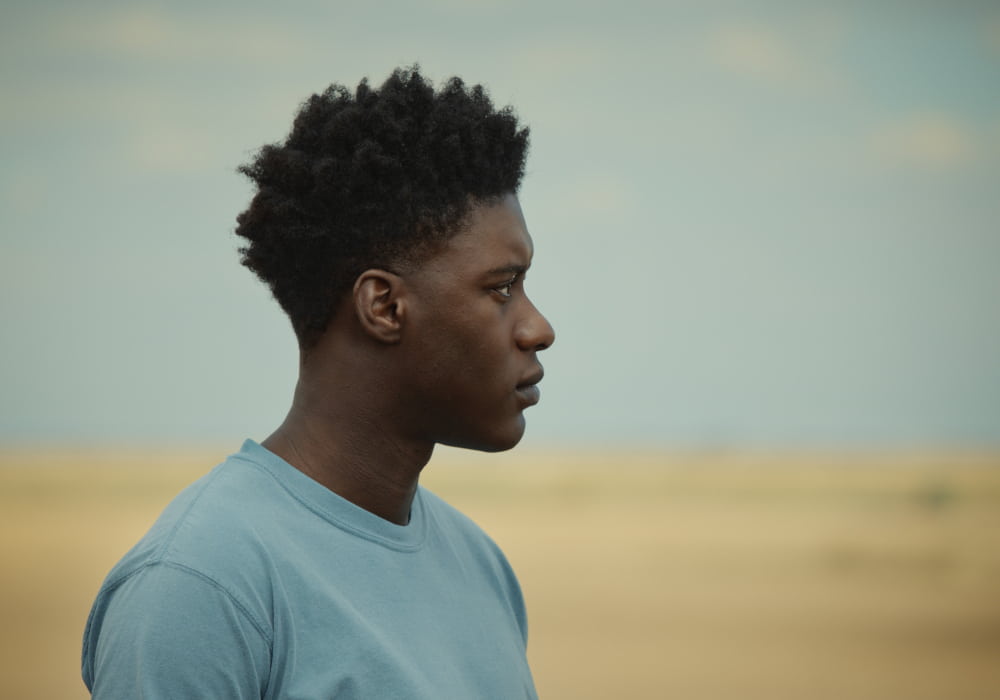
Although Dolce Fine Giornata circles around the notion of privilege, the concept is better examined in the British film The Last Tree, a sophomore feature by Shola Amoo, which tells the coming-of-age story of British-Nigerian Femi. Raised by a white foster mum in a mostly-white rural English town, he’s suddenly ripped from the guardian he knows to live with his biological mother — a virtual stranger. More jarring still, he’s in a rough London neighbourhood, surrounded by more people who look like him.
He’s angry at his mother for abandoning him and unsettling his life, and she feels under enormous stress to provide as a single parent. It’s the perfect storm to ensure that two people who love each other clash and a smart teenage boy starts on a path of rebellion that could ruin his future.
Though you can feel the gears of the film’s obvious three-act structure clicking into place, and there are clumsy bits here and there, Amoo offers emotionally bracing insights about the immigration experience. Amoo’s film is smart about the ways Femi has been taught to hate himself and his mother, and the insecurities he feels from never feeling like he belonged — either with his foster mother or his biological one.
The Last Tree really makes us feel the systemic troubles Femi faces. His mother abandoned him so she could get an education and earn enough to give him a better life, but even the best of intentions can be traumatizing.
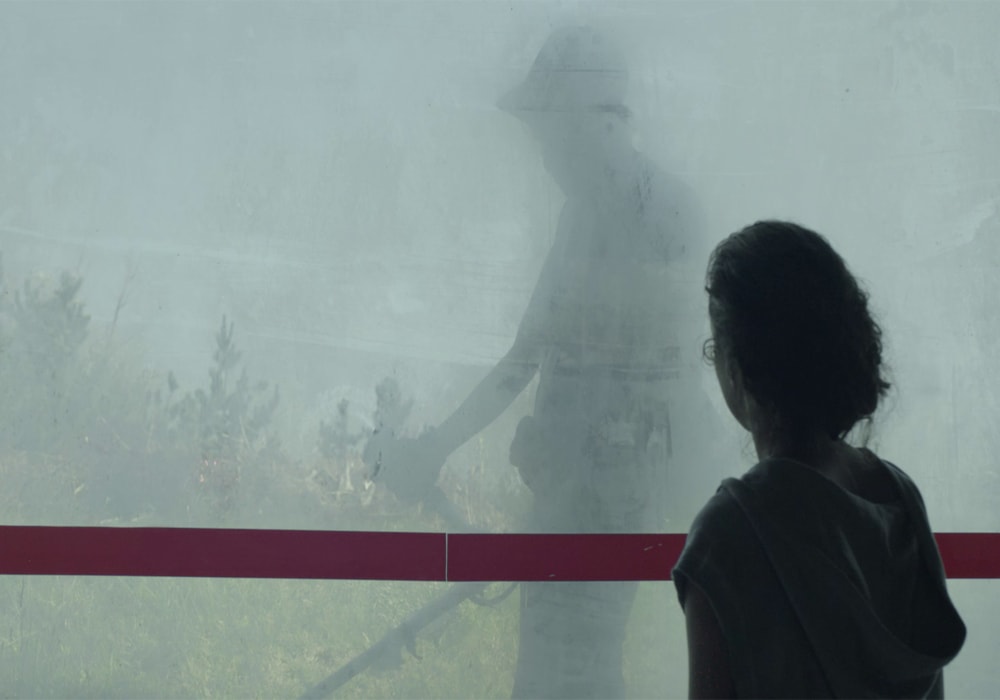
Sharks, Courtesy of Sundance Institute 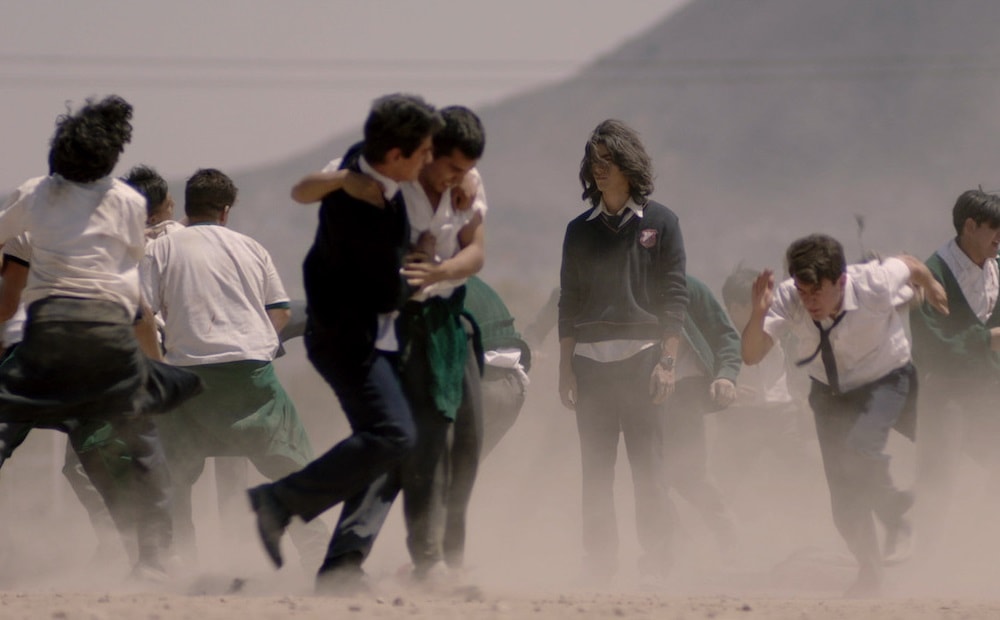
This is not Berlin, Courtesy of Sundance Institute
Coming-of-age stories are Sundance’s bread-and-butter, both among American films and foreign films. (The Souvenir is even one of them). While the World Dramatic Competition has, in the past, offered some of the best coming-of-age stories of recent years — from Sand Storm to The Wound.
The Sharks (dir. Lucia Garibaldi)
By comparison, this year’s crop was relatively weak. Uruguayan writer-director Lucía Garibaldi’s debut feature The Sharks approaches teenage girl sexuality from a sideways angle. When adolescent Rosina finds a connection with one of her father’s employees, Joselo, at her summer job, she’s not sure her feelings are sexual or platonic, but she likes the attention.
Since Joselo is a few years older, his intentions prove explicitly sexual, but he doesn’t connect with her emotionally, and she doesn’t know what to do when he starts masturbating in front of her. He loses interest, and she seeks moderate revenge to remind him she’s not to be trifled with. Unfortunately, Garibaldi finds few shades to Rosina’s characterization, exploring neither her broader life nor her sexuality in much depth.
This is not Berlin (dir. Hari Sama)
Mexican filmmaker Hari Sama’s This is not Berlin is mostly interesting for the story it’s trying to tell — the night life of subversive queer culture in 1980s Mexico. While most boys his age spend their hours playing soccer and obsessing over the world cup which will be played locally, 17-year-old Carlos (Xabiani Ponce de León) finds himself drawn into a group of queer artists and activists, joining them in their orgies and their anti-homophobia rallies. Painting this subculture is what Sama is most interested in: a rebellious group of punk-loving young people who want to be at the centre of change even as they’re aware that Mexico City is hardly the legendary Weimar Berlin.
To the film’s credit, it leaves Carlos’ sexuality ambiguous: is he drawn to the queer, punk subculture because it’s an escape from conventional masculinity or because of his sexuality? When we first meet Carlos, he doesn’t quite fit in: he faints during the turf fight his friends get him into, and he has long, luscious curls that he has to pin back for school.
The film dangles a conventional storyline for him: a boy-next-door pining after an older, unattainable girl, but she turns out to just be the MacGuffin. She introduces him to the alternative subculture that becomes his new home: a group of queer, punk, young male artists.
It’s a time when masculinity is policed by both institutions and Carlos’ classmates; homophobic slurs and gay bashings are the norm. For Carlos, meeting people who are open and subversive, and aren’t judgmental, is liberating. At times a bit clunky, This is not Berlin is a lot of fun most of the time, and Ponce de León is both a beautiful and a compelling presence.
Dirty God (dir. Sacha Polak)
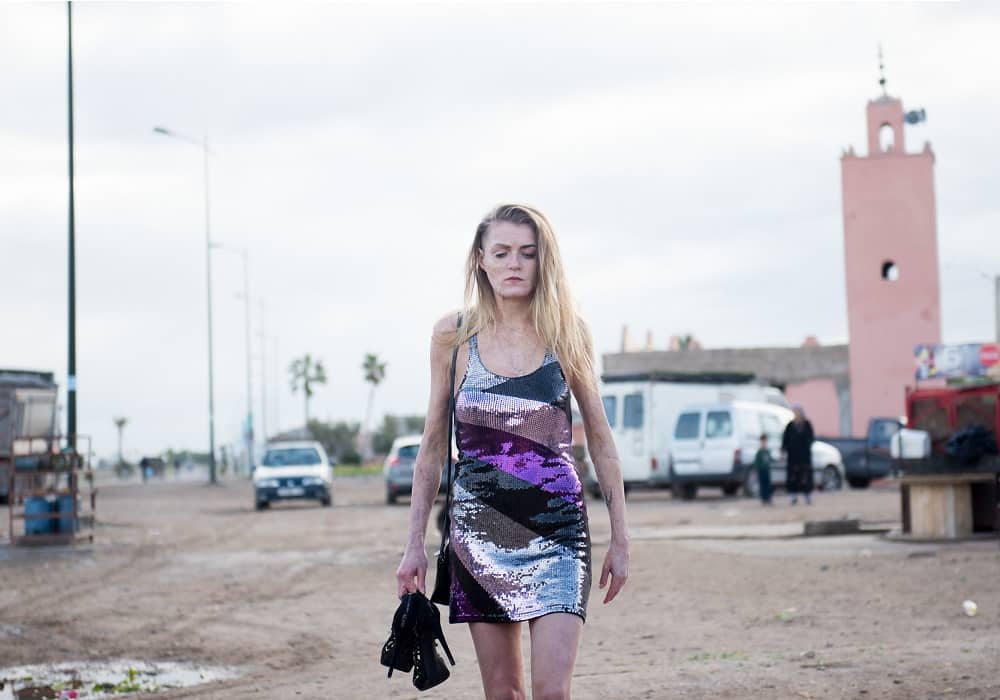
The strongest coming-of-ager was the British film Dirty God, which follows a twentysomething single mother, Jade (Vicky Knight), as she recovers from an acid attack that left her body covered in scars. The film’s provocative opening scans her scarred flesh with a pop song intoning “I am skin,” which sounds on the nose but is actually quite powerful. We are immediately drawn into Jade’s world, where the damaged skin is simply what she has to wear and cope with. Her scars are primarily a source of pain and discomfort, but they forever change the way the outside world looks at her.
Jade’s self-confidence is fundamentally shaken by what the judge calls “disfiguring” scars that were inflicted by someone she loved. When we meet her fairly young, beautiful, and extremely well groomed mother, we sense Jade has learned that her value lies in her looks. Now that she’s often seen as broken rather than beautiful, she has exchanged the gaze she received as one kind of object (the desirable woman) for another (the scarred outcast). It leads her to accept toxic relationships and fall victim to a fool’s errand, going to Morocco for plastic surgery, in search of a panacea that doesn’t exist.
Despite all of these outside signals about who she is or should be, Jade finally finds her own path. By getting a job and succeeding at it, she leaves her mother’s criminal business behind and begins to forge a real future for herself. There, she makes friends worth having so she can see the toxic relationships she has for what they are and get out. Jade is resilient but desperate. So even when the film’s script requires her to do some incredibly stupid things, she recovers and we keep rooting for her.

